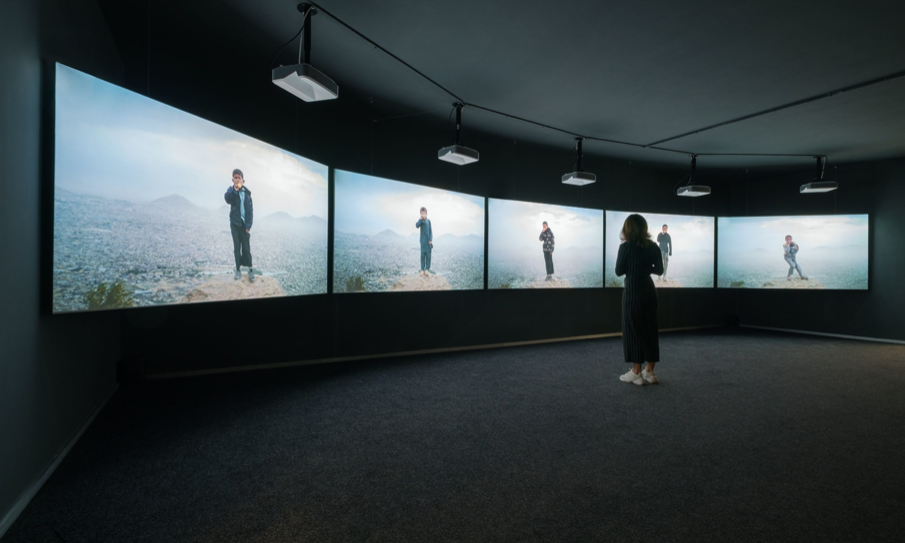Aziz Hazara's Bow Echo (2019) Courtesy of the artist and PinchukArtCentre © 2021. Photo: Maksim Belousov
The Afghan artist Aziz Hazara has won the $100,000 Future Generation Art Prize 2021 for his “exceptional and sophisticated” video work depicting children in Kabul. The international prize, awarded to artists under 35 by the PinchukArtCentre in Kiev, Ukraine, also recognised three artists as Special Prize winners—Agata Ingarden from Poland, Mire Lee from South Korea and Pedro Neves Marques from Portugal—who share a $20,000 award. The winners were announced in online award ceremony on 8 December.
Hazara, who receives a $60,000 cash prize and $40,000 to fund his artistic practice, won for his work Bow Echo (2019), a five-channel video work that explores the ways people interact with their environment. Each of the screens depicts a young boy, set against the mountainous landscape of Kabul, trying to play a brightly coloured toy bugle in the brisk wind. In a statement, the prize’s jury describe the work as “a gesture of remembrance and mourning that doubles as an urgent call for attention to a perilous situation […] The piece holds many paradoxes in a simple scene: the playfulness of childhood, the limitlessness of grief, the conquest of land and territory, and the precarity of the future.”
The work seems to have particularly resonated with the jury given the tumultuous situation in Afghanistan this year, with the Taliban recapturing control of the country in August, 20 years after the US and its allies invaded in 2001. “Bow Echo offers a striking time-based monument to resilience and hope for a geography that has, for many generations, remained under the pressure of various forms of failed governance. At the same time, the piece shows how artists continue to imagine complex independent ways of existence even amidst conflicts that seem never-ending.”
In his speech at the awards ceremony Victor Pinchuk, the Ukrainian billionaire founder of the PinchukArtCentre and the Future Generation Art Prize, talked about the importance of art in our current “challenging and crazy times”. “This idea of the Future Generation Art Prize came to me in 2008 in the middle of the global financial crisis,” he said. “Maybe for you—young artists—it would be useful to know and understand that crisis is a fantastic source of inspiration. Nobody can tell us better about this world than great, especially young, emerging artists. You are able to express the future of this world much better than politicians can.”
The Future Generation Art Prize 2021 jury included Lauren Cornell, the director of the graduate programme and the chief curator at the Center for Curatorial Studies at Bard College; Jacopo Crivelli Visconti, the curator of the 34th edition of the Bienal de São Paulo; Elvira Dyangani Ose, the director of the Museu d'Art Contemporani de Barcelona; Bjorn Geldhof, the artistic director of PinchukArtCentre; Ralph Rugoff, the director of the Hayward Gallery in London; Eugene Tan, the director of the National Gallery Singapore and the Singapore Art Museum; and the artist Shilpa Gupta.
Twenty artists were shortlisted for the 6th edition of the Future Generation Art Prize out of more than 11,000 entries from almost 200 countries, plus the collective Yarema Malashchuk and Roman Himey who were automatically nominated to the shortlist as the winner of the PinchukArtCentre Prize 2020, a contemporary art prize awarded to young Ukrainian artists below the age of 35. An exhibition of the shortlisted artists is on show at the PinchukArtCentre until 27 February 2022.
Former winners of the Future Generation Art Prize include the British artist Lynette Yiadom-Boakye (2012); Nástio Mosquito and Carlos Motta (2014); and the Lithuanian artist Emilija Škarnulytė (2019).

